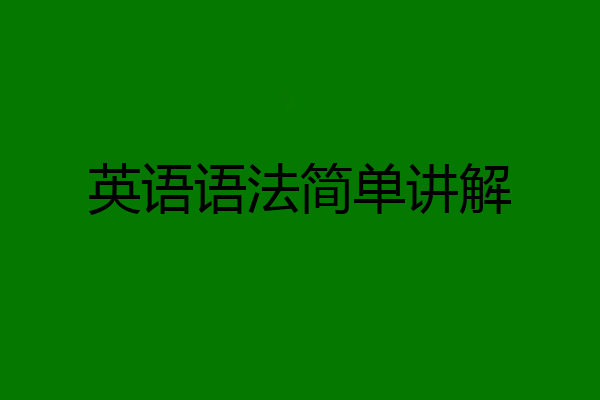
枫糖17苹果派
英语语法是针对英语语言进行研究后,系统地总结归纳出来的一系列语言规则。下面是我为你收集整理的英语简单语法知识点,一起来看看吧。
英语简单语法知识点【1】
主要掌握几种时态
1,一般现在时
2,一般过去时
3,一般将来时
4,现在进行时
还有几种词
1,名词
2,代词
3,形容词
4,动词
5,冠词
英语简单语法知识点【2】
一、词法
1、名词
A)、名词的数
我们知道名词可以分为可数名词和不可数名词,而不可数名词它没有复数形式,但可数名词却有单数和复数之分,复数的构成如下:
一)在后面加s。如:fathers, books, Americans, Germans,apples, bananas
二)x,sh, ch, s, tch后加es。如:boxes,glasses, dresses, watches, wishes, faxes
三)1)以辅音字母加y结尾的变y为i再加es如:baby-babies, family-families,duty-duties, comedy-comedies, documentary-documentaries, story-stories
2)以元音字母加y结尾的直接加s。如:day-days,boy-boys, toy-toys, key-keys, ways
四)以o结尾加s(外来词)。如:radios, photos, 但如是辅音加o的加es:如: tomatoes西红柿, potatoes马铃薯
五)以f或fe结尾的变f为v再加es(s)。如:knife-knives, wife-wives,half-halves, shelf-shelves, leaf-leaves, yourself-yourselves
六)单复数相同(不变的)有:fish, sheep, deer鹿子, Chinese, Japanese
七)一般只有复数,没有单数的有:people, pants, shorts, shoes, glasses, gloves, clothes, socks
八)单词形式不变,既可以是单数也可以是复数的有:police警察局,警察, class班,同学, family家,家庭成员
九)合成的复数一般只加主要名词,多数为后一个单词。如:action movie-action movies, pen pal-pen pals; 但如果是由man或woman所组成的合成词的复数则同时为复数。如:man doctor-men doctors, woman teacher-women teachers
十)有的单复数意思不同。如:fish鱼 fishes鱼的种类,paper纸 papers报纸,卷子,论文, work工作 works作品,工厂, glass玻璃glasses玻璃杯,眼镜,orange桔子水 oranges橙子, light光线lights灯, people人 peoples民族,time时间 times时代, 次数, chicken 鸡肉chickens小鸡
十一) 单个字母的复数可以有两种形式直接加s或’s。如:Is (I’s), Ks (K’s)。但如是缩略词则只加s。如:IDs, VCDs, SARs
十二) 特殊形式的有:child-children, man-men, woman-women, foot-feet, mouse-mice,policeman-policemen, Englishman-Englishmen
B)名词的格
当我们要表示某人的什么东西或人时,我们就要使用所有格形式。构成如下:
一)单数在后面加’s。如:brother’s, Mike’s, teacher’s
二)复数以s结尾的直接在s后加’,如果不是以s结尾的与单数一样处理。如:Teachers’ Day教师节,classmates’; Children’s Day六一节, Women’s Day三八节
三)由and并列的名词所有时,如果是共同所有同一人或物时,只加最后一个’s,但分别拥有时却分别按单数形式处理。如:Mike and Ben’s room迈克和本的房间(共住一间),Mike’s and Ben’s rooms迈克和本的房间(各自的房间)
2、代词
项目人称代词 物主代词 指示代词 反身代词
人称 主格 宾格 形容词 名词性
第一人称 单数 I me my mine myself
复数 we us our ours ourselves
第二人称 单数 you you your yours yourself
复数 you you your yours yourselves
第三人称 单数 she her her hers herself
he him his his himself
it it its its this that itself
复数 they them their theirs these thosethemselves
3、动词
A)第三人称单数
当动词是第三人称单数时,动词应该像名词的单数变动词那样加s,如下:
一)一般在词后加s。如:comes, spells, waits, talks, sees,dances, trains
二)在x,sh, ch, s, tch后加es。如:watches,washes, wishes, finishes
三)1)以辅音字母加y结尾的变y为i再加es。如:study-studies, hurry-hurries, try-tries
2)以元音字母加y结尾的直接加s。如:plays, says, stays, enjoys, buys
四)以o结尾加es。如:does, goes
五)特殊的有:are-is, have-has
B)现在分词
当我们说某人正在做什么事时,动词要使用分词形式,不能用原形,构成如下:
一)一般在后加ing。如:spell-spelling, sing-singing,see-seeing, train-training, play-playing, hurry-hurrying, watch-watching,go-going, do-doing
二)以不发音e的结尾的去掉e再加ing。如:dance-dancing, wake-waking, take-taking, practice-practicing,write-writing, have-having
三)以重读闭音节结尾且一个元音字母+一个辅音字母(注意除开字母组合如show –showing, draw-drawing)要双写最后的辅音字母再加ing。如:put-putting, run-running, get-getting,let-letting, begin-beginning
四)以ie结尾的变ie为y再加ing。如:tie-tying系die-dying死lie-lying 位于
英语简单语法知识点【3】
4、形容词的级
我们在对两个或以上的人或物进行对比时,则要使用比较或最高级形式。构成如下:
一) 一般在词后加er或est(如果是以e结尾则直接加r或st)。如:greater-greatest,shorter –shortest, taller –tallest,longer –longest, nicer- nicest, larger -largest
二)以重读闭音节结尾且1个元音字母+1个辅音字母(字母组合除外,如few-fewer fewest)结尾的双写结尾的辅音再加er /est。如:big-bigger biggest, red-redder reddest, hot-hotter hottest
三) 以辅音字母+y结尾的变y为i加er/est。如:happy-happier happiest,sorry-sorrier sorriest, friendly-friendlier friendliest(more friendly mostfriendly), busy-busier busiest, easy-easier easiest
四)特殊情况:(两好多坏,一少老远)
good/well -better best many/much - more most bad/ill– worse worst
little- lessleast old- older/elder oldest/eldest far- farther/further farthest/furthest
5、数词 (基变序,有规则;一、二、三,自己背;五、八、九、十二;其它后接th;y结尾,变为i, eth跟上去。)first, second, third; fifth, eighth, ninth, twelfth; seventh, tenth,thirteenth, hundredth; twenty-twentieth, forty-fortieth, ninety-ninetieth


实创13720050898
英语对于现在的中国学生来说已经成为了一种重要的语言。英语作为一种语言,本身就是一个系统,需要靠英语语法来规范,接下来我为你整理了英语简单语法知识点,一起来看看吧。
there be 句型,be going to 结构
1. Be going to 结构,表示打算,准备,计划做某事
结构:主语+be动词+going to +动词原型
I am going to make a bookcase.
They are going to paint it.
The father is going to give the bookcase to his daughter.
变疑问句将be动词移到句首
Are you going to make a bookcase?
Are they going to paint it?
Is the father going to give the bookcase to his daughter?
变否定句在be动词后面加not
I am not going to make a bookcase.
They are going to paint it.
The father is not going to give the bookcase to his daughter.
肯定回答及否定回答
Yes, I am. No, I am not.
Yes, they are. No, they are not.
Yes, he is. No, he is not.
特殊疑问句
What are you going to do?
What are they going to do?
What is the father going to do?
2. There be 句型:表示哪里有什么东西(某处有某物)
There is+单数名词+表示场所的词(一般为介词词组)
There is a book in this room.
There is a pen on the table
There are+复数名词+表示场所的词(一般为介词词组)
There are two pens on the table.
There are three schools there.
变疑问句将be动词移到句首
Is there a book in this room?
Are there two pens on the table?
变否定句在动词后面加not
There is not a book in this room.
There are not two pens on the table.
肯定回答及否定回答
Yes, there is. No, there is not.
Yes, there are. No, there are not.
选择疑问句:是指提出两个或两个以上可能的答案供对方选择的句式
一种是以一般疑问句的结构形式为基础,只是在语调上有所区别。
例如:Would you like coffee or tea?
这一类选择疑问句通常都是在前一个供选择的答案用低升调,后一个用降调;如果有两个以上供选择的答案,则在最后一个用降调,其余都用低升调。
例如:
Would you like a gin,or a whisky,or a `beer?
你是要喝杜松子酒,还是威士忌酒,还是啤酒?
这种语调上的特征往往是区别选择疑问句和一般疑问句的重要标志。试比较:
Shall we leave at six or `seven?
我们是 6 点动身还是 7点动身?
Shall we leave at six or seven?
我们在6,7点钟动身好吗?
上述第一例是选择疑问句,其答案只能是两者之一。
We shall leave at six/seven.我们将在6点/7点动身。
上述第二例是一般疑问句,它的答案只是 yes/no,而且并不肯定是6点或7点,甚至可能既不是6点,也不是7点:
Yes,we shall leave at six or seven.是的,我们将在 6, 7点钟动身。
No.We must leave earlier.不。我们必须早点动身。
另一种选择疑问句是以特殊疑问句的结构形式为基础的,也是在语调上有所区别。
例如:Which vase shall I use, the short one or the tall one ? The tall one.
在选择疑问句中的冠词用法。
Is she a housewife or a nurse?(她是一个家庭主妇还是护士?)
其中,or后的不定冠词a/an 不能省略。
特殊疑问句:以特殊疑问词开头,对句中某一成分提问的句子。
常用的疑问词有:what who whose which when where how why等。
可先分为3种:
疑问代词:what,who,which,whose,whom
疑问副词:when,where,why,how
疑问形容词:what(which,whose)+名词
特殊疑问句有两种语序
1.如疑问词作主语或主语的定语,即对主语或主语的定语提问,其语序是陈述句的语序:
疑问词(+主语)+谓语动词+其他成分。
如:Who is singing in the room﹖ whose bike is broken﹖
2.如疑问词作其他成分,即对其他成分提问,其语序是:疑问词+一般疑问句语序?如:What class are you in﹖
What does she look like﹖
Where are you from﹖
What time does he get up every morning﹖
How do you know﹖
注意:
1.回答特殊疑问句时,不能用yes / no,即问什么答什么,尤其是简略回答。如:
Who is from Canada﹖ Helen (is).
Where's the restaurant﹖ Near the station.
Why do you like koalas﹖ Because they are cute.
2.特殊疑问句一般读降调(↓)。
特殊疑问词
Who谁——Whose谁的(加se)
Why为什么
When什么时候
Where在哪里
Which哪一个
What什么 ( What time什么时间 What colour什么颜色)
How怎么样
How many多少{数量}
How much多少钱{价格},
多少(对不可数名词进行提问)
How long多长
How often多少次
How big多大
How heavy多重{重量}
优质英语培训问答知识库